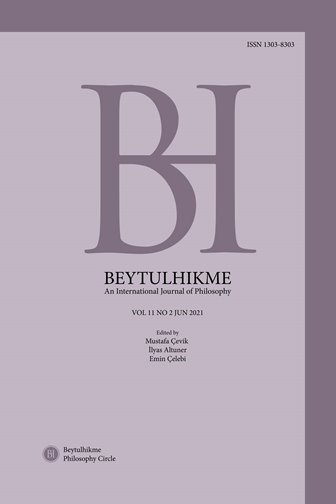Author :
Abstract
Tanrı için “Zorunlu Varlık” terimini kullanması İbn Sînâ’nın felsefî-teolojik düşünceye kazandırdığı en önemli yeniliklerden biridir. Zorunlu Varlık terimi hem İslam hem Batı düşüncesinde büyük kabul görmüş, ontolojik delil, kozmolojik delil, varlık-mahiyet ayırımı, varlığın yüklem olma/ması ve ilahi basitlik gibi tartışmaların odağında yer almıştır. Geç dönem İslam düşüncesinde metafizik tartışmaların sürdürüldüğü en güçlü ve uzun soluklu mecralardan bir haline gelen Nasîruddîn Tûsî’nin Tecrîdü’l-İ‘tikâd adlı kısa ve veciz eseri üzerine yazılan şerh ve haşiye geleneğinde tartışılan temel meselelerden biri de Zorunlu Varlık’ın zorunluluğunun nasıl anlaşılması gerektiği problemidir. Tartışmanın esası Tanrı’nın basitliğiyle zorunluluğu arasında bir çelişki bulunup bulunmadığı problemine dayanmaktadır. Bir taraftan Tanrı’nın varlığı ile mahiyetinin özdeş olduğunu söyleyip diğer taraftan Tanrı’nın zorunluluğunu zatının/mahiyetinin varlığı gerektirmesi biçiminde tanımlamak ilk bakışta basitlik ile zorunluluk arasında bir tenakuz olduğu sonucuna götürebilir. Bu makalenin amacı Tûsî’nin üç önemli yorumcusunun, İsfehânî, Ali Kuşçu ve Devvânî’nin Zorunlu Varlık’ın zorunluluğunun keyfiyeti hakkındaki görüşlerini ilahi basitlik açısından analiz etmektir. Ayrıca giriş kısmında klasik İslam düşüncesi çalışmalarında takip edilmesi gereken yöntem hakkında kısa, eleştirel bir değerlendirme de yapılmaktadır.
Keywords
Abstract
Using the term "Necessary Existent" for God is one of the most important innovations that Avicenna brought into philosophical and theological thought. The term Necessary Existent has been widely accepted in both Islamic and Western tradition and has been at the center of discussions such as the ontological argument, cosmological argument, divine simplicity, the distinction of quiddity and existence, and the debate whether ‘exist’ is a predicate or not. One of the main issues discussed in the tradition of commentaries and glosses on the short and concise work of Nasir al-Din al-Tusi named Tajrid al-I'tiqad, which has become one of the most powerful and long-lasting mediums in which metaphysical debates are carried out in late-period Islamic thought, is how to understand the necessity of the Necessary Existent. The core of the debate is based on the problem of whether there is a contradiction between the simplicity and necessity of God. On the one hand, saying that God's existence and quiddity are identical, and on the other hand, defining God's necessity as requiring the existence by his quiddity/self may lead to the conclusion that there is a contradiction between simplicity and necessity at first sight. The purpose of this article is to analyze the views of three important commentators of al-Tusi, al-Isfahani, al-Qushji and al-Dawani, about the necessity of the Necessary Existent in terms of divine simplicity. In addition, a brief, critical evaluation of the method to be followed in classical Islamic thought studies is also made in the introduction.
Keywords
- Apaydın, Y. (2019). Metafiziğin Meselesini Temellendirmek: Tecrîd Geleneği Bağla- mında Umûr-ı Âmme Sorunu. İstanbul: Endülüs.
- Bozkurt, Ö. (2014). “İbn Sînâ’nın Tanrı Anlayışının Dayandığı Temel İlkeler”, Di- yanet İlmi Dergi, 50(1), 67-86.
- Cürcânî, S.Ş. (1992). Var-olanların Dereceleri. Recep Duran. Seyyit Şerif Cürcânî’nin Var-olanların Dereceleri (Merâtibu’l-Mevcûdat) Risalesi. (Arabic text, translation into Turkish), Ankara Üniversitesi Dil ve Tarih-Coğrafya Fakültesi Dergisi, 35(2), 64-68.
- Cürcânî, S. Ş. (2020). Hâşiyetü’t-Tecrîd. 2 cilt. (Tah. E. Altaş vd.). Ankara: TDV Yayınları.
- Devvânî, C. (2002). Risâletü İsbâti’l-Vâcibi’l-Cedîde. Seb-u Resâîl. (Tah. A. Tuy- sirkânî). Tahran: Mîrâs-ı Mektûb, 117-170.
- Erdem, E. (2020). Ali Kuşçu: Zorunlu Varlık’ın Zorunluluğu Üzerine Bir Tartışma. Uluslararası 14. Ve 15. Yüzyıl İslam Düşüncesinde Felsefe, Kelâm ve Tasavvuf Sempozyum Bildirileri I. (Ed. M. Demirkol vd.). Ankara: AYBU, 91-98.
- Hillî, M. (1988). Keşfu’l-Murâd fî şerhi Tecrîdi’l-i'tikâd. Beyrut: Müessesetü’l-E‘lamî li’l-Matbûât.
- İbn Sînâ (2004). Kitâbu’ş-Şifâ: Metafizik I. (Arapça-Türkçe metin; Çev. E. Demirli- Ö. Türker). İstanbul: Litera Yayıncılık.
- İbn Sînâ (2005). Kitâbu’ş-Şifâ: Metafizik II. (Arapça-Türkçe metin; Çev. E. Demirli-
- İsfehânî, M.A. (2020). Tesdîdü’l-Kavâ‘id fî Şerhi Tecrîdi’l-‘Akâ‘id. 2 cilt. (Tah. E. Altaş vd.). Ankara: TDV Yayınları.
- Kara-Ali, M. (2014). Constructivism at the Birth of the Scientific Revolution: A Study of the Foundations of Qushjī’s Fifteenth Century Astronomy. (Dr Tezi). Malaysia: International Islamic University.
- Pehlivan, N. (2020). “Bir Âdâbu’l-Bahs ve’l-Munâzara Uygulaması Olarak Ali Kuşçu(ö.879/1474)’nun Şerhu Tecrîdi’l-Kelâm (=eş-Şerhu’l-Cedîd). Uluslararası 14. Ve 15. Yüzyıl İslam Düşüncesinde Felsefe, Kelam ve Tasavvuf Sempozyumu Bildirileri I. (Ed. M. Demirkol vd.). Ankara: AYBU Yayınları, 172-193.
- Pourjavady, R. (2017). Jalāl al- Dīn al- Dawānī (d. 908/1502), Glosses on ʿAlāʾ al- Dīn al- Qūshjī’s Commentary on Naṣīr al- Dīn al- Ṭūsī’s Tajrīd al- iʿtiqād. The Oxford Handbook of Islamic Philosophy. (Ed. K. Al-Rouayheb, S. Scmidthke). New York: Oxford University Press, 415-437.
- Reçber, M.S. (2009) “Vâcibü’l-Vücûd’un” Mahiyeti Meselesi. Uluslararası İbn Sînâ Sempozyum Bildiriler. (Ed. M. Mazak, N. Ozkaya). İstanbul: İBB Kültür A.Ş., 307-315.





